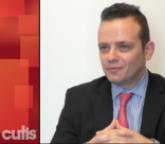For Residents

Yoga for Dermatologic Conditions
As both a dermatology resident and yoga instructor, I find the potential correlation between the 2 disciplines to be interesting and a growing...
Suzanne M. Olbricht, MD
From the Department of Dermatology, Lahey Hospital & Medical Center, Burlington, Massachusetts.
The author reports no conflict of interest.
Correspondence: Suzanne M. Olbricht, MD, Lahey Clinic, 41 Burlington Mall Rd, Burlington, MA 01805 (suzanne.m.olbricht@lahey.org).

Not only a form of knowledge but a skill that can be practiced and mastered, empathy consists of observation, listening, introspection, and deliberation repeated in cycles as needed to come to a conclusion. It is a cognitive process that acknowledges competing interests in a respectful nonjudgmental way. Its manifestation is that of the provider being fully present but without the emotional complications of concern or pity. Why should we, as physicians, bother with adding the skill of empathy to our clinical armamentarium?
The patient was in his 70s—a professor, not quite retired, who was quiet but engaged. The basal cell carcinoma on his temple was finally clear after 4 stages of Mohs micrographic surgery. The resident and I discussed an A-to-T flap for reconstruction as we reviewed his last slides at the microscope. While I finished another repair, the resident went into the procedure room to explain the proposed repair. He was still with the patient when I finished but finally came out saying the patient understood what we wanted to do, so I entered the room, ready to put on my gloves.
Something about the way the patient looked at me made me stop. I went over to him, put my hand on his arm, and said, “I know you’ve heard about the repair. It will look really good when we are done and you are healed. Are you ready?” He continued looking at me and nodded. Because I was not sure why he was looking at me, I kept looking at him eye-to-eye and talked about the procedure. I started my usual explanation of why we have to move tissue to close the defect, and out of the corner of my eye I could see his foot moving while he peered back at me. I went back to explaining about the tumor and the Mohs procedure and what had created the defect, and his foot stopped moving. Then I started talking about the repair again, reassuring him that we would avoid his eye, leaving his vision intact, and that we could place most of the scar in his hairline. His foot started moving again. He kept looking at me and I kept looking back at him with my hand on his arm.
By this time I knew there was something about the repair that made the patient uncomfortable, but I did not know what. I said something about the bandage and asked whether that would bother him during his classes or in meetings. He said no, and his foot stopped momentarily. Then I said that while we wanted to do this repair, I could give him other treatment options. I started to talk about Mother Nature (second intention healing). His look got less intense and his foot stopped moving, so I discussed the end result of this healing process, the time it would take to heal, and the required wound care. Then the patient took a big breath, smiled, and said, “Mother Nature always does a good job for me.”
Empathy is a tool that can be used in the patient-physician relationship to arrive at a mutually acceptable plan of action. Empathy is defined in the dictionary as “the action of understanding, being aware of, being sensitive to, and vicariously experiencing the feelings, thoughts, and experience of another of either in the past or present without having the feelings, thoughts, and experience fully communicated in an objectively explicit manner.”1 However, I prefer the more simple explanation that empathy is engaged curiosity about another’s emotional perspective.2 It is not sympathy, which is sharing another person’s emotions with mutual susceptibility, and it is not compassion, which is the emotion that drives us to help someone in need. Instead, empathy is a form of knowledge, albeit reflexive and personal, as if the physician were momentarily in the place of the patient. An empathetic physician also retains a sense of self so that he/she can be purposeful and objective in examining the information gained in that moment. Empathy is openness to oneself (Why do I have an odd feeling about the way the patient is looking at me?) as well as openness to the patient (Why is his foot moving?).
Not only a form of knowledge but also a skill that can be practiced and mastered, empathy consists of observation, listening, introspection, and deliberation repeated in cycles as needed to come to a conclusion. It is a cognitive process that acknowledges competing interests in a respectful nonjudgmental way. Its manifestation is that of the provider being fully present but without the emotional complications of concern or pity.
Why should we, as physicians, bother with adding the skill of empathy to our clinical armamentarium? First, although the physiology of empathy is not well understood, it has physiologic effects in the physician-patient relationship. Skin conductance studies of 20 well-established patient-therapist dyads documented a significant positive correlation between skin conductance concordance and patient reports of perceived therapist empathy (P=.03).3 Secondly, it has been found that physician empathy, as determined by the ability to understand a patient’s needs, encouraged patient cooperation, pain relief, and healing in studies of metastatic cancer4 and trauma surgery patients5; the physician-patient relationship was protected even if patient’s needs were unmet. Third, empathy can speed up the process of developing a mutually agreed upon treatment plan. My discussion with the patient presented here lasted less than 5 minutes, and the resident, who had spoken to the same patient for 30 minutes, expressed amazement that I “knew” the patient did not want to undergo the proposed procedure. The use of empathy definitely fits within the profile of professional ethics, as it attends to the basic principle of respecting the autonomy of the patient. It certainly promotes teamwork and an integrative approach to patient care.6 Empathy also allows us to take good care of patients who have a long list of physical traits and characteristics that are known to elicit negative responses from physicians, such as an unkempt appearance or substance abuse.7 Empathy may even have a therapeutic context of its own. Behavioral scientists hypothesize that empathy allows emotions to be managed in a socially positive way that conserves metabolically costly resources and facilitates adaptation to environmental changes.8 Importantly for physicians, having empathy can protect against the symptoms and consequences of burnout.9

As both a dermatology resident and yoga instructor, I find the potential correlation between the 2 disciplines to be interesting and a growing...

The benefits of educational intervention on health outcomes has been widely discussed, but the most educational methods have not been addressed....

Difficult patient encounters in the dermatology office can be navigated through honest physician-patient communication regarding problems within...
